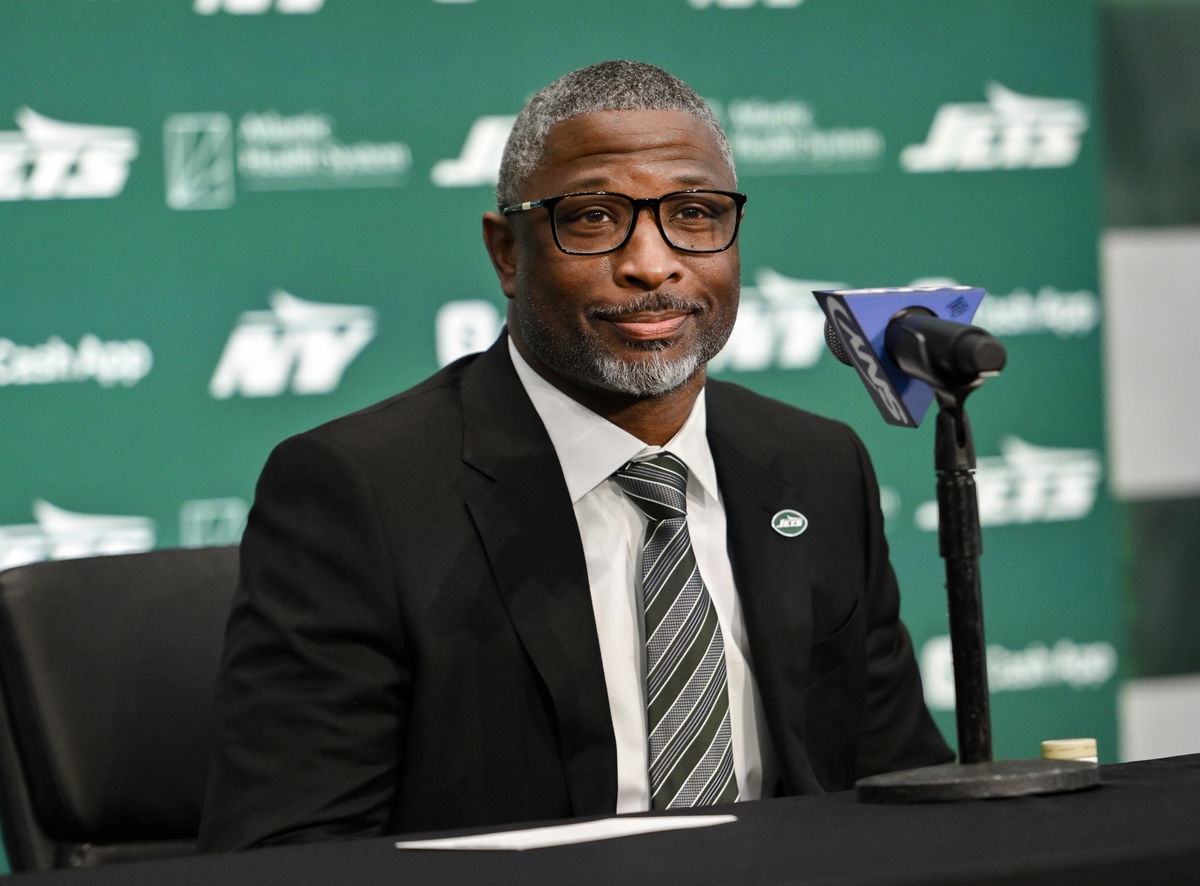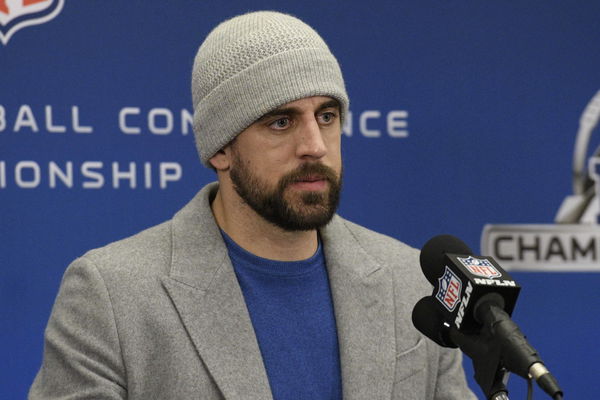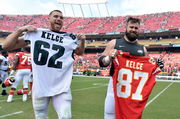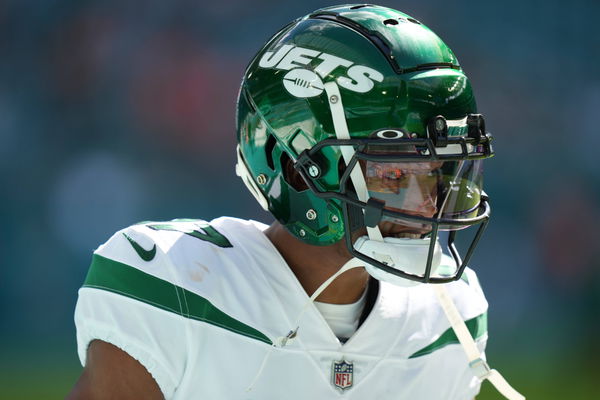
Imago
NFL, American Football Herren, USA New York Jets-Head Coach Aaron Glenn Introductory press conference, PK, Pressekonferenz Jan 27, 2025 Florham Park, NJ, USA New York Jets head coach Aaron Glenn speaks during his introductory press conference at Atlantic Health Jets Training Center. Florham Park Atlantic Health Jets Training Center NJ USA, EDITORIAL USE ONLY PUBLICATIONxINxGERxSUIxAUTxONLY Copyright: xJohnxJonesx 20250127_jla_ja1_053

Imago
NFL, American Football Herren, USA New York Jets-Head Coach Aaron Glenn Introductory press conference, PK, Pressekonferenz Jan 27, 2025 Florham Park, NJ, USA New York Jets head coach Aaron Glenn speaks during his introductory press conference at Atlantic Health Jets Training Center. Florham Park Atlantic Health Jets Training Center NJ USA, EDITORIAL USE ONLY PUBLICATIONxINxGERxSUIxAUTxONLY Copyright: xJohnxJonesx 20250127_jla_ja1_053
“I can stand in front of a room full of men and give as many rah‑rah speeches as I possibly can, but culture is about people and getting the right people in the building.” Aaron Glenn gave that warning shot as soon as he joined the Jets. From the moment Glenn stepped up to the microphone in Florham Park, he made one thing a surety: he had no regard for noise, legacy, or flash. He was here to repair a broken culture.
Watch What’s Trending Now!
Glenn, who spent the final three seasons helping to transform the Detroit Lions from bottom feeders to NFC contenders, knows what it takes to flip a locker room. In Detroit, he built a top-10 defense from scratch. However, in New York, his assignment is bigger. Rebuild not just the roster, but the expectations. And it did not take long for Glenn to show exactly what he had in mind by “getting the right people in the building.”
The Jets made this offseason a decision that few people thought they’d ever make. They parted ways with Aaron Rodgers. As rated by PFF, this was the best offseason decision by the Gang Green. Yes, after all, Rodgers wasn’t only a quarterback. He was the face of a franchise in desperate need of relevance. And Glenn wasn’t shy about why. Sources in the building made it clear that Glenn and GM Darren Mougey were in accord early on with this move. The culture, broken under prior leadership, couldn’t withstand another season of uncertainty and sway from a 41-year-old quarterback who spent less time in team huddles than he did on The Pat McAfee Show. This was a much-needed move for the Jets.
ADVERTISEMENT

USA Today via Reuters
NFL, American Football Herren, USA NFC Championship-Green Bay Packers at Atlanta Falcons, Jan 22, 2017 Atlanta, GA, USA Green Bay Packers quarterback Aaron Rodgers 12 speaks to media after the game against the Atlanta Falcons in the 2017 NFC Championship Game at the Georgia Dome. Atlanta defeated Green Bay 44-21. Mandatory Credit: Dale Zanine-USA TODAY Sports, 22.01.2017 19:03:15, 9832484, NPStrans, Georgia Dome, NFL, Atlanta Falcons, Green Bay Packers, Aaron Rodgers PUBLICATIONxINxGERxSUIxAUTxONLY Copyright: xDalexZaninex 9832484
Rodgers‘s 2024 season wasn’t terrible by the numbers. He played all 17 games, throwing for 3,897 yards, 28 touchdowns, and 11 interceptions—solid production by any standard. Yet the Jets still stumbled to a 5–12 record. The offense ranked in the bottom five in both third-down conversions and red zone efficiency. Behind the scenes, tensions flared. Rodgers reportedly clashed with offensive coaches and voiced frustration with the playbook. The message was clear: this wasn’t working.
That’s when Glenn stepped in with a decisive move. He remembered from his time in Detroit that genius means little without trust and structure. The Lions didn’t rise by following a single voice—they rose by uniting voices behind a shared mission. That’s what Glenn is now building in New York. And his first true culture-defining act wasn’t about who he let go—it was about who he chose to keep.
ADVERTISEMENT
Extending Garrett Wilson: New leadership for a new era
Almost in lockstep with Rodgers’s departure, the Jets signed wide receiver Garrett Wilson to a four-year, $130 million contract extension, including $90 million guaranteed. It wasn’t just a smart business move—it was an unequivocal vote of confidence in the team’s new direction. Wilson, who tallied 94 receptions for 1,210 yards and 7 touchdowns in 2024, remained one of the league’s most reliable targets despite a revolving door at quarterback. But more than the numbers, it was Wilson’s mindset that stood out.
ADVERTISEMENT
He didn’t get involved in any politics. He just showed up—week after week—and played. That’s why, according to sources within the organization, Wilson had already become a go-to presence in the locker room during the second half of 2024’s chaotic season, often stepping into the leadership void left by Rodgers’s absence. He stayed late at practice. He spoke up in film sessions. And maybe most importantly, he made one thing clear: he was in New York for the long haul.
That’s the kind of player Glenn wants to build around. Wilson’s extension wasn’t just about money—it was a declaration. The Jets are shifting focus toward players who lead with presence, not platform. Where Rodgers brought flash, Wilson brings forward momentum. And he’s not alone.
Top Stories
Josh Allen’s Stance on Brian Daboll’s Hiring Confirmed as Bills Mafia Signs Petition for Sean McDermott’s Return

Patrick Mahomes Bids Emotional Goodbye as Chiefs Part Ways With Longtime Coach

Colts Issue Statement on FBI Investigation Into Jim Irsay’s Death as Controversial Details Emerge After Former Owner’s Passing

Travis Kelce Announces New Career Move For Brother Jason Amid Taylor Swift Breakup Rumors

Tyreek Hill Issues Final Statement on Chiefs Return After Cryptic Eric Bieniemy Message


Imago
MIAMI GARDENS, FL – JANUARY 08: New York Jets wide receiver Garrett Wilson 17 warms up before the game between the New York Jets and the Miami Dolphins on Sunday, January 8, 2023 at Hard Rock Stadium, Miami Gardens, Fla. Photo by Peter Joneleit/Icon Sportswire NFL, American Football Herren, USA JAN 08 Jets at Dolphins Icon230108043
Glenn has reportedly taken a hands-on role in developing second-year center Joe Tippmann, challenging him to take ownership in the offensive line room. On defense, linebacker Quincy Williams will reportedly be calling plays—a sign that outside star power will overshadow homegrown talent.
ADVERTISEMENT
The influence that was once imported under the previous regime is now growing organically. That shift is what makes this moment significant. The Jets didn’t just move on from a quarterback—they moved on from the uncertainty that came with him. With Rodgers, everything carried a footnote: Would he return healthy? Would he buy into the game plan? Would he even stay long enough to build something lasting?
Those questions are gone. In their place is a clearer identity—one built on accountability, youth, and long-term cohesion. Garrett Wilson is no afterthought. He’s a statement. A bet on a player who belongs to the future, not one clinging to the past. For the first time in a long time, the Jets aren’t building around a name—they’re building around a nucleus.
ADVERTISEMENT
And Glenn, with his no-nonsense Detroit DNA, is proving that leadership isn’t about saying the right things. It’s about making the right calls—even the hard ones.
ADVERTISEMENT
ADVERTISEMENT
ADVERTISEMENT



